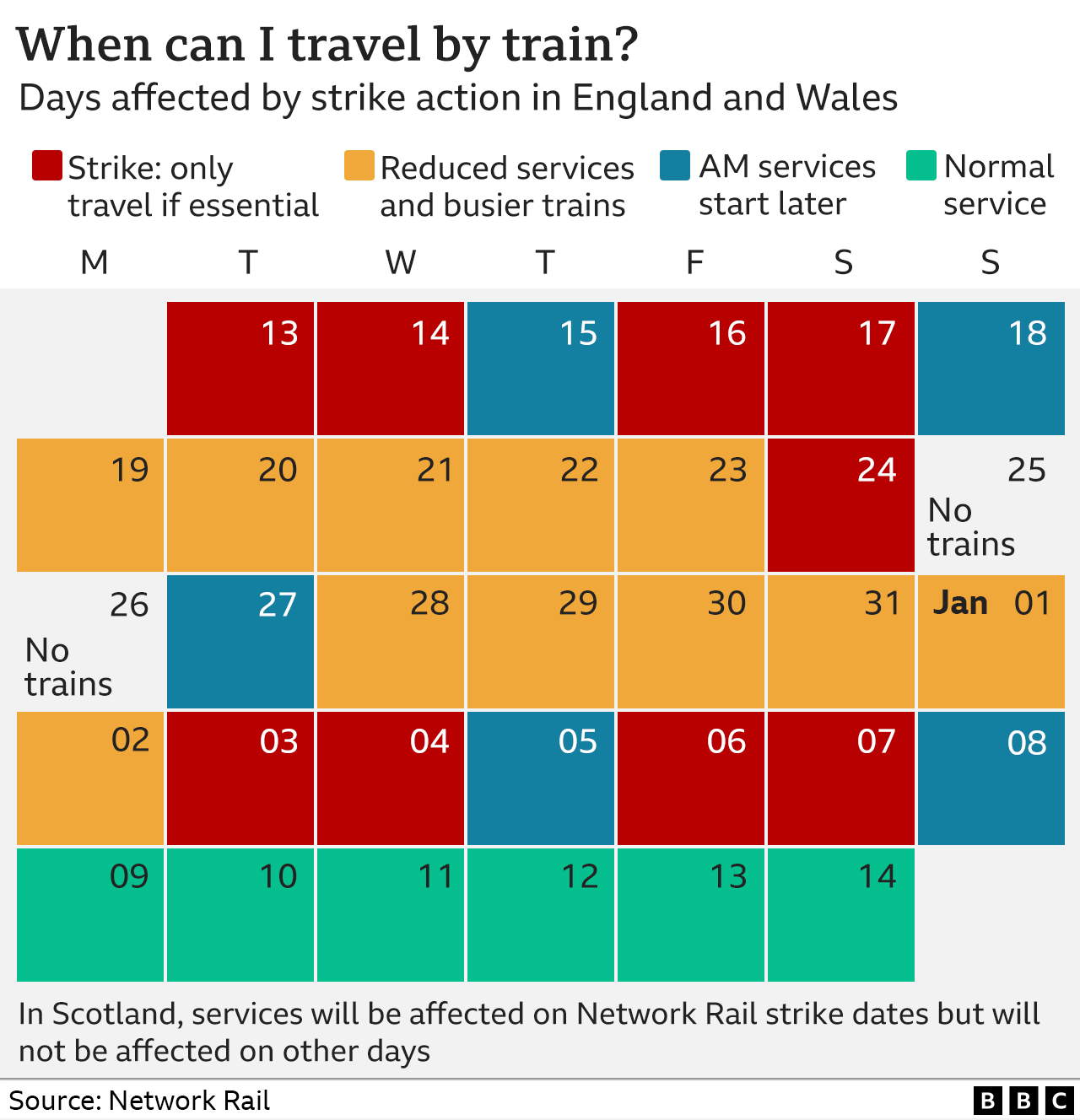BBC News 16 December 2022
Rail passengers are being warned of the near total shutdown of Britain's railways, with strikes on Friday and Saturday.
What are the train strikes dates in December and January?
The RMT rail workers' union has announced strikes on:
- Friday and Saturday, 16-17 December
- Saturday 24 (from 18:00 GMT) until Tuesday 27 December
- Tuesday and Wednesday, 3-4 January
- Friday and Saturday,6-7 January
These will follow strikes on Tuesday 13 December and Wednesday 14 December
Previous strikes by the RMT have had a major impact on services throughout England, Scotland and Wales.
Passengers should check their train-operating company's website and only travel if absolutely necessary.
Network Rail - which owns and maintains the rails, signals and stations - says half of rail lines will be shut on strike days. Most of Scotland and Wales will have no trains running at all.
Significant disruption is also likely on non-strike days.
Unite the Union will also strike - affecting East Midlands Railway - on 23 and 24 December.
The train drivers' union, Aslef, is also in a dispute over pay - although currently, no further walkouts are planned.
When is the Eurostar strike?
Security staff on the Eurostar train service were set to strike for four days in the run-up to Christmas.
The walkouts were planned for 16, 18, 22 and 23 December.
But the strikes on 16 and 18 December have been called off, while the RMT members consider a pay offer. The other strike days are still due to go ahead.
Eurostar said it would update customers as soon as possible if there was any impact on services. The RMT said the strike would "severely affect" passengers.
Why have railway workers been on strike?
The unions are in dispute with the government and rail companies about pay, job cuts and changes to terms and conditions.
Unions say any pay offer should reflect the rising cost of living.
But the rail industry is under pressure to save money, after the pandemic left a hole in its finances. Bosses say reforms need to be agreed, to afford pay increases and modernise the railway.
Network Rail is planning to cut 1,900 jobs as part of changes to the way its maintenance teams work - although it insists most of this could be achieved by people leaving voluntarily.
The RMT disagrees with some of the changes and wants a guarantee of no compulsory job losses.
What deal have rail workers been offered?
Network Rail made an offer of a 5% pay rise this year and a 4% pay rise in 2023.
But RMT union boss Mick Lynch described the deal as "substandard" and its members have rejected it.
The union also rejected an offer from the Rail Delivery Group (RDG) - which represents train companies. That included a pay increase of up to 8% over two years and a guarantee of no compulsory redundancies until April 2024.
In exchange, it wanted repurposing or closure of ticket offices and Sunday working.
The RDG offer is separate to negotiations with Network Rail, which employs about half the workers in the dispute.
How much are rail workers paid?
The Office for National Statistics (ONS) has estimated the average salary of rail workers in 2022 as £45,919, based on five different job categories.
If drivers are excluded, its estimate is £39,518.
The RMT said that figure was still too high because it excluded rail cleaning staff who are not categorised as rail workers by the ONS.

